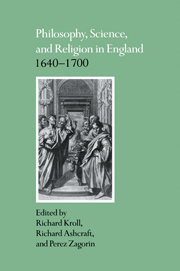Book contents
- Frontmatter
- Contents
- Notes on contributors
- Preface
- 1 Introduction
- Part I The Cambridge Platonists: philosophy at mid century
- 2 Henry More, the Kabbalah, and the Quakers
- 3 Edward Stillingfleet, Henry More, and the decline of Moses Atticus: a note on seventeenth-century Anglican apologetics
- 4 Latitudinarians, neoplatonists, and the ancient wisdom
- 5 Cudworth, More and the mechanical analogy
- 6 Cudworth and Hobbes on Is and Ought
- Part II The Restoration settlement
- Index
6 - Cudworth and Hobbes on Is and Ought
Published online by Cambridge University Press: 05 November 2011
- Frontmatter
- Contents
- Notes on contributors
- Preface
- 1 Introduction
- Part I The Cambridge Platonists: philosophy at mid century
- 2 Henry More, the Kabbalah, and the Quakers
- 3 Edward Stillingfleet, Henry More, and the decline of Moses Atticus: a note on seventeenth-century Anglican apologetics
- 4 Latitudinarians, neoplatonists, and the ancient wisdom
- 5 Cudworth, More and the mechanical analogy
- 6 Cudworth and Hobbes on Is and Ought
- Part II The Restoration settlement
- Index
Summary
The towering stature of Thomas Hobbes in the intellectual history of the seventeenth century can be measured not only by the originality and importance of his contribution to philosophy, but also by the extent of the opposition his ideas provoked. It is of course true that Hobbes attracted a number of disciples and followers who absorbed some of his conceptions. Nevertheless, it is safe to say that no other English philosopher of the time was forced to encounter so many adversaries. In the controversies surrounding his work, moreover, it was largely his arguments that defined the terms of the discussion. These facts demonstrate the exceptional influence and even fascination Hobbes exerted upon the minds of his contemporaries; for such influence is manifested not only in assent and approval, but equally in the dissent and polemics of which he was so frequently the target. In a word, Hobbes's thought was an inescapable presence to contemporary thinkers, confronting them with a formidable challenge which many felt obliged to answer.
Of the seventeenth-century attacks on Hobbes, most possessed little intrinsic value and serve primarily to illustrate the scope of the reaction his ideas aroused. Others, however, were of a higher caliber and presented issues which remain of permanent interest. Among the works in this category are the writings of Ralph Cudworth.
Born in 1617 and associated for much of his life with Cambridge University, Cudworth's reputation is bound up with that of the Cambridge Platonists, of whom he was one of the principal representatives. Together with Henry More he was the leading philosopher of the group.
- Type
- Chapter
- Information
- Philosophy, Science, and Religion in England 1640–1700 , pp. 128 - 148Publisher: Cambridge University PressPrint publication year: 1992
- 1
- Cited by



